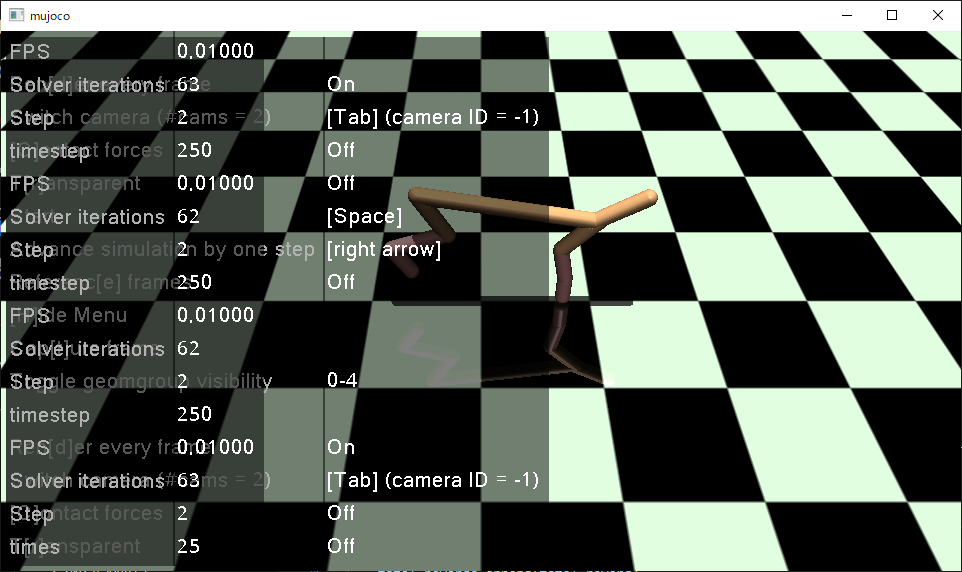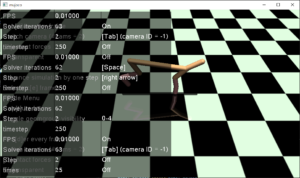import os
import numpy as np
import torch as T
import torch.nn.functional as F
import torch.optim as optim
from make_env import make_env
""" pip install
pip uninstall torch
pip install torch==1.4.0
pip uninstall numpy
pip install numpy==1.14.5
"""
"""
#env = make_env('simple')
env = make_env('simple_adversary')
observation = env.reset()
print(observation)
print(observation[0])
print(env.action_space)
print(env.action_space[0])
"""
# リプレイバッファのクラスを作成する
class MultiAgentReplayBuffer:
def __init__(self, max_size, critic_dims, actor_dims,
n_actions, n_agents, batch_size):
# 引数をアトリビュートとして保存する
self.mem_cntr = 0 # メモリーカウンター
self.mem_size = max_size # メモリーサイズ
self.critic_dims = critic_dims
self.actor_dims = actor_dims
self.n_actions = n_actions
self.n_agents = n_agents
self.batch_size = batch_size
# メモリーの枠を確保する
self.state_memory = np.zeros((self.mem_size, critic_dims))
self.new_state_memory = np.zeros((self.mem_size, critic_dims))#同じ
self.reward_memory = np.zeros((self.mem_size, n_agents))
self.terminal_memory = np.zeros((self.mem_size, n_agents), dtype=bool)#最終状態は値がないようにマスクする
# アクターメモリーの初期化(メソドの作成が必要)
self.init_actor_memory()
""" memo
print(np.zeros((2,3)))
[[0. 0. 0.]
[0. 0. 0.]]
"""
# アクターメモリーの初期化
def init_actor_memory(self):
self.actor_state_memory = []
self.actor_new_state_memory = []
self.actor_action_memory = []
for i in range(self.n_agents):
self.actor_state_memory.append(
np.zeros((self.mem_size, self.actor_dims[i])))
self.actor_new_state_memory.append(
np.zeros((self.mem_size, self.actor_dims[i])))
self.actor_action_memory.append(
np.zeros((self.mem_size, self.n_actions)))
# トランジションの保存
def store_transition(self, raw_obs, state, action, reward,
raw_obs_, state_, done):
if self.mem_cntr % self.mem_size == 0 and self.mem_cntr > 0:
self.init_actor_memory()
index = self.mem_cntr % self.mem_size
for agent_idx in range(self.n_agents):
self.actor_state_memory[agent_idx][index] = raw_obs[agent_idx]
self.actor_new_state_memory[agent_idx][index] = raw_obs_[agent_idx]
self.actor_action_memory[agent_idx][index] = action[agent_idx]
self.state_memory[index] = state # ここで8次元と28次元で食い違っている
self.new_state_memory[index] = state_
self.terminal_memory[index] = done
self.mem_cntr += 1
# サンプルバッファー
def sample_buffer(self):
max_mem = min(self.mem_cntr, self.mem_size)
batch = np.random.choice(max_mem, self.batch_size, replace=False)
states = self.state_memory[batch]
rewards = self.reward_memory[batch]
states_ = self.new_state_memory[batch]
terminal = self.terminal_memory[batch]
actor_states = []
actor_new_states = []
actions = []
for agent_idx in range(self.n_agents):
actor_states.append(self.actor_state_memory[agent_idx][batch])
actor_new_states.append(self.actor_new_state_memory[agent_idx][batch])
actions.append(self.actor_action_memory[agent_idx][batch])
return actor_states, states, actions, rewards , \
actor_new_states, states_, terminal
def ready(self):
if self.mem_cntr >= self.batch_size:
return True
return False
# クリティックのニューラルネットワークを作成する
class CriticNetwork(T.nn.Module):
def __init__(self, beta, input_dims, fc1_dims, fc2_dims,
n_agents, n_actions, chkpt_dir, name):
# CriticNetworkクラスの親クラスT.nn.Moduleの___init__()にアクセスして、初期化する
super(CriticNetwork, self).__init__() # super()で親クラスの__init__()を呼び出す
#super(CriticNetwork, self).__init__()# 親のクラス=super(現在のクラス名,現在のクラス)
self.chkpt_dir = chkpt_dir
self.chkpt_file = os.path.join(chkpt_dir, name)
self.fc1 = T.nn.Linear(input_dims+n_agents*n_actions, fc1_dims)
self.fc2 = T.nn.Linear(fc1_dims, fc2_dims)
self.q = T.nn.Linear(fc2_dims, 1) # 出力は一つのみ
self.optimizer = optim.Adam(self.parameters(), lr=beta)
self.device = T.device('cuda:0' if T.cuda.is_available() else 'cpu')
self.to(self.device)
if not os.path.exists(self.chkpt_file):
with open(self.chkpt_file, 'w'):
pass
# 順伝播する
def forward(self, state, action):
# Q関数のNN入力は 現在のstateと方針piのNN出力としてのactionの2つである。
x = T.cat((state, action), dim=1) #列方向に合体する
x = F.relu(self.fc1(x))
x = F.relu(self.fc2(x))
q = self.q(x) # 出力は一つのみ
return q
def save_checkpoint(self):
if not os.path.exists(self.chkpt_file):
with open(self.chkpt_file, 'w'):
pass
# state_dictは、モデルのパラメータを格納しているPythonの辞書オブジェクト
T.save(self.state_dict(), self.chkpt_file)
def load_checkpoint(self):
self.load_state_dict(T.load(self.chkpt_file))
# アクターのニューラルネットワークを作成する
class ActorNetwork(T.nn.Module):
def __init__(self, alpha, input_dims, fc1_dims, fc2_dims,
n_actions, chkpt_dir, name):
# ActorNetworkクラスの親クラスT.nn.Moduleの___init__()にアクセスして、初期化する
super(ActorNetwork, self).__init__() # 親のクラス=super(現在のクラス名,現在のクラス)
self.chkpt_file = os.path.join(chkpt_dir, name)
self.fc1 = T.nn.Linear(input_dims, fc1_dims)
self.fc2 = T.nn.Linear(fc1_dims, fc2_dims)
self.pi = T.nn.Linear(fc2_dims, n_actions) # 方策piはactionの選択肢の数分用意する
self.optimizer = optim.Adam(self.parameters(), lr=alpha)
self.device = T.device('cuda' if T.cuda.is_available() else 'cpu')
self.to(self.device)
if not os.path.exists(self.chkpt_file):
with open(self.chkpt_file, 'w'):
pass
# 順伝播する
def forward(self, state):
# 方針piのNN入力はstateのみで良い。出力はpi
x = F.relu(self.fc1(state)) # ここでエラーが出ている
x = F.relu(self.fc2(x))
pi = T.softmax(self.pi(x), dim=1) # これも列方向 dim=1
return pi
def save_checkpoint(self):
if not os.path.exists(self.chkpt_file):
with open(self.chkpt_file, 'w'):
pass
# state_dictは、モデルのパラメータを格納しているPythonの辞書オブジェクト
T.save(self.state_dict(), self.chkpt_file)
def load_checkpoint(self):
self.load_state_dict(T.load(self.chkpt_file))
class Agent:
def __init__(self, agent_idx,
actor_dims, critic_dims,
n_agents, n_actions,
fc1=64, fc2=64,
alpha=0.01, beta=0.01,
gamma=0.95, tau=0.01,
chkpt_dir='tmp/maddpg/'):
self.gamma = gamma
self.tau = tau
self.n_agents = n_agents
self.n_actions = n_actions
self.agent_name = 'agent_%s' % agent_idx
self.chkpt_dir = chkpt_dir
#アクターとクリティックのNNをインスタンス化
self.actor = ActorNetwork(alpha, actor_dims, fc1, fc2, n_actions,
chkpt_dir=self.chkpt_dir, name=self.agent_name+'_actor')
self.critic = CriticNetwork(beta, critic_dims, fc1, fc2, n_agents, n_actions,
chkpt_dir=self.chkpt_dir, name=self.agent_name+'_critic')
# ターゲットアクターとターゲットクリティックのNNをインスタンス化
self.target_actor = ActorNetwork(alpha, actor_dims, fc1, fc2, n_actions,
chkpt_dir=self.chkpt_dir, name=self.agent_name+'_target_actor')
self.target_critic = CriticNetwork(beta, critic_dims, fc1, fc2, n_agents, n_actions,
chkpt_dir=self.chkpt_dir, name=self.agent_name+'_target_critic')
# NNのパラメーターを更新する
self.update_network_parameters(tau=1)
# NNパラメータのアップデート
def update_network_parameters(self, tau=None):
if tau is None:
tau = self.tau
# ターゲットアクターとアクターに対してNNパラメータのアップデート
target_actor_params = self.target_actor.named_parameters()
actor_params = self.actor.named_parameters()
target_actor_state_dict = dict(target_actor_params)
actor_state_dict = dict(actor_params)
for name in actor_state_dict:
actor_state_dict[name] = tau*actor_state_dict[name].clone() + \
(1-tau)*target_actor_state_dict[name].clone()
self.target_actor.load_state_dict(actor_state_dict)
# ターゲットクリティックとクリティックに対してNNパラメータのアップデート
target_critic_params = self.target_critic.named_parameters()
critic_params = self.critic.named_parameters()
target_critic_state_dict = dict(target_critic_params)
critic_state_dict = dict(critic_params)
for name in critic_state_dict:
critic_state_dict[name] = tau*critic_state_dict[name].clone() + \
(1-tau)*target_critic_state_dict[name].clone()
self.target_critic.load_state_dict(critic_state_dict)
# actionを選択する
def choose_action(self, observation):
state = T.tensor(np.array([observation]), dtype=T.float).to(self.actor.device)
actions = self.actor.forward(state)
noise = T.rand(T.tensor(self.n_actions).to(self.actor.device)) #n_actionsは整数なのでtensorに変換する
action = actions + noise
return action.detach().cpu().numpy()[0]
# モデルを保存する
def save_models(self):
self.actor.save_checkpoint()
self.target_actor.save_checkpoint()
self.critic.save_checkpoint()
self.target_critic.save_checkpoint()
# モデルをロードする
def load_models(self):
self.actor.load_checkpoint()
self.target_actor.load_checkpoint()
self.critic.load_checkpoint()
self.target_critic.load_checkpoint()
# MADDPクラスを作成する
class MADDPG:
def __init__(self,
actor_dims, critic_dims, n_agents, n_actions,
fc1=64, fc2=64,
alpha=0.01, beta=0.01,
gamma=0.99, tau=0.01,
scenario='simple_adversary',
chkpt_dir='tmp/maddpg/'):
self.agents = []
self.n_agents = n_agents
self.n_actions = n_actions
chkpt_dir += scenario
for agent_idx in range(self.n_agents):
self.agents.append(Agent(agent_idx,
actor_dims[agent_idx], critic_dims,
n_agents, n_actions,
fc1=64, fc2=64,
alpha=0.01, beta=0.01,
gamma=0.95, tau=0.01,
chkpt_dir=chkpt_dir))
def save_checkpoint(self):
print('==== saving checkpoint ====')
for agent in self.agents:
agent.save_models()
def load_checkpoint(self):
print('==== loading checkpoint ====')
for agent in self.agents:
agent.load_models()
def choose_action(self, raw_obs):
actions = []
for agent_idx, agent in enumerate(self.agents):
action = agent.choose_action(raw_obs[agent_idx])
actions.append(action)
return actions
def learn(self, memory):
if not memory.ready():
return
# リプレイバッファーのメモリからデータを引っ張り出す
actor_states, states, actions, rewards,\
actor_new_states, states_, dones = memory.sample_buffer()
# できれば,cudaを使いたい
device = self.agents[0].actor.device
states = T.tensor(states, dtype=T.float).to(device)
actions = T.tensor(actions, dtype=T.float).to(device)
rewards = T.tensor(rewards, dtype=T.float).to(device)
states_ = T.tensor(states_, dtype=T.float).to(device)
dones = T.tensor(dones).to(device)
# 全てのエージェントの行動を入れる箱
all_agents_new_actions = []
all_agents_new_mu_actions = []
old_agents_actions = []
# エージェント毎に行動を空リストへappendしていく
for agent_idx, agent in enumerate(self.agents):
#まずは新しい状態new_statesを定義する
new_states = T.tensor(actor_new_states[agent_idx],
dtype=T.float).to(device)
# ターゲットアクターNNを順伝搬
new_pi = agent.target_actor.forward(new_states) # ここでActorNN.forwardへ飛ぶ1024x8
# 新しい方針(行動)new_piをappendする
all_agents_new_actions.append(new_pi)
# 次はmu_statesをやっていく muは現在のstatesでの方策(行動)μ(θ)のこと
mu_states = T.tensor(actor_states[agent_idx],
dtype=T.float).to(device)
# アクターNNを順伝搬
pi = agent.actor.forward(mu_states)# ここでActorNN.forwardへ飛ぶ1024x8
# 新しい方針(行動)new_piをappendする
all_agents_new_mu_actions.append(pi)
old_agents_actions.append(actions[agent_idx])
new_actions = T.cat([acts for acts in all_agents_new_actions], dim=1)
mu = T.cat([acts for acts in all_agents_new_mu_actions], dim=1)
old_actions = T.cat([acts for acts in old_agents_actions], dim=1)
for agent_idx, agent in enumerate(self.agents):
# target_qの計算1024x1:ターゲットクリティック(次の状態、次の行動)1024x28, 1024x15
critic_value_ = agent.target_critic(states_, new_actions).flatten()
critic_value_[dones[:,0]] = 0.0 # バッチ1024全てのエージェント0のdonesを0.0にする
# qの計算
critic_value = agent.critic(states, old_actions).flatten()
#収益計算(割引率考慮):target = 即時報酬r + (割引率γ x 次の状態行動価値q)
target = rewards[:, agent_idx] + (agent.gamma * critic_value_)
#criticNNの損失計算
critic_loss = F.mse_loss(target.detach(), critic_value)
# criticの誤差逆伝播
agent.critic.optimizer.zero_grad() # 勾配初期化
critic_loss.backward(retain_graph=True) # 損失関数から勾配を計算
agent.critic.optimizer.step()
# =================================
# actorNNの損失計算
actor_loss = agent.critic.forward(states, mu)#.flatten()
actor_loss = - actor_loss.mean() # 本当にmeanか?
#actor_loss = - actor_loss
#actorの誤差逆伝播
agent.actor.optimizer.zero_grad()
actor_loss.backward(retain_graph=True) # ここでエラーが起こっている
#actor_loss = actor_loss.detach() # 独自に追加:detach()を使用して、計算グラフを切り離す
agent.actor.optimizer.step()
"""改良コードだが、動かなかったので元に戻した
with T.no_grad():
agent.actor.optimizer.zero_grad()
actor_loss_copy = actor_loss.clone() # コピーを作成する
actor_loss_copy.backward(retain_graph=True) # コピーに対して誤差逆伝播を行う
actor_loss = actor_loss_copy.detach() # 独自に追加:detach()を使用して、計算グラフを切り離す
actor_loss = actor_loss_copy.detach() # detach()を使用して、計算グラフを切り離す
agent.actor.optimizer.step()
"""
# agentのパラメータ更新実行(actor, critic, target_actor, target_critic)
agent.update_network_parameters()
#以上を3エージェント分繰り返す
def obsavation_list_to_state_vector(observation):
state = np.array([])
for obs in observation:
# 観察空間を縦につなげていく
state = np.concatenate([state, obs])
return state
# ここからがメインスクリプト
if __name__ == '__main__':
# 勾配エラー検出をオンにする
#T.autograd.set_detect_anomaly(True)
# シナリオを定義する
#scenario = 'simple'
scenario = 'simple_adversary'
# 環境を定義する
env = make_env(scenario)
# エージェントの数を定義する
n_agents = env.n # 3
print('n_agents : ', n_agents) # 1
# アクターの次元を初期化する = []
actor_dims = []
# エージェントの数だけ繰り返す
for i in range(n_agents):
# エージェントの次元にエージェントiの観察空間の数を入れる
actor_dims.append(env.observation_space[i].shape[0]) #8, 10, 10
print(f'actor_dims : {actor_dims}') # actor_dims : [8, 10, 10]
# 全てのエージェントについて、アクターの観察空間数を足し算した数をクリティックNNの入力次元とする
# が、間違ってないか?アクターの観察空間数を全部足したらアクターNNの入力次元ではないか?
critic_dims = sum(actor_dims) # 28 = 8 + 10 + 10
# 行動空間の数を定義する
n_actions = env.action_space[0].n # 5
# MADDPGに基づいたエージェントのインスタンスを作成する
# args: アクターの次元[8,10,10]、クリティックの次元28、エージェントの数3、行動空間の数5
# NN第一層のノード数64、NN第二層のノード数64、アクターNNの学習率0.01、クリティックNNの学習率0.01,
# シナリオsimple_adversary, チェックポイント保存用フォルダ
maddpg_agents = MADDPG(actor_dims, critic_dims,
n_agents, n_actions,
fc1=64, fc2=64,
alpha=0.01, beta=0.01,
gamma=0.99, tau=0.01,
scenario=scenario,
chkpt_dir='tmp/maddpg/')
# リプレイバッファーからのメモリーのインスタンスを作成する
memory = MultiAgentReplayBuffer(1000000, critic_dims, actor_dims,
n_actions, n_agents, batch_size=1024)
# 出力頻度
PRINT_INTERVAL = 500
# 試行回数
N_GAMES = 30000
# 1試行中の最大ステップ数
MAX_STEPS = 25
# 初期化
total_steps = 0
best_score = 0
# 学習=False , 評価検証=True
evaluate = False # or True
# 評価検証の場合は学習済みのモデルパラメータをダウンロードする
if evaluate:
maddpg_agents.load_checkpoint()
# 試行回数分繰り返す
for i in range(N_GAMES):
# gym環境リセット 初期位置・初期条件
obs = env.reset()
score = 0
score_history = []
done = [False] * n_agents # エージェントの数ぶん
episode_step = 0
# 全エージェントのdoneが格納されているdoneリストの各要素が全部Trueでない限り繰り返す。
# つまり、全エージェントがゴールに到達したら繰り返しは終了する。
while not any(done):
if evaluate:
env.render()
# 環境obsのときエージェントがとる行動確率から行動を抽出し、決定する
actions = maddpg_agents.choose_action(obs)
# 決定した行動から、次の環境、報酬、ゴールしたかどうか、その他情報を得る
obs_, reward, done, info = env.step(actions)
# 環境obsをベクトルに変換して状態stateとする。
state = obsavation_list_to_state_vector(obs)
# 次の環境obs をベクトルに変換して次の状態state_とする。
state_ = obsavation_list_to_state_vector(obs_)
# ここで、最大ステップを超えたら全エージェントのdoneを強制的にTrueにする。
if episode_step > MAX_STEPS:
done = [True] * n_agents
# リプレイバッファメモリーにトランジションを保存する
memory.store_transition(obs, state, actions, reward, obs_, state_, done)
# 100ステップ毎に実行する
if total_steps % 100 == 0 and not evaluate:
# インスタンスを引数にとるとどうなるのか?
maddpg_agents.learn(memory)
# 次の環境を現在の環境としてアップデートする
obs = obs_
# 全エージェントの報酬をスコアとして加算する
score += sum(reward)
# ステップ数を更新する
total_steps += 1
# エピソードを更新する
episode_step += 1
# スコアを履歴に追加する
score_history.append(score)
# スコア履歴から平均スコアを算出する
avg_score = np.mean(score_history[-100:])
if not evaluate:
# ベストスコアより平均スコアのほうが高ければ
if avg_score > best_score:
# チェックポイントを保存
maddpg_agents.save_checkpoint()
# 平均スコアをベストスコアとして上書きする
best_score = avg_score
if i % PRINT_INTERVAL == 0 and i > 0:
print('(episode)', i, 'average_score {:.1f}'.format(avg_score))
print('Script is done')
#1:47:03
# #https://www.youtube.com/watch?v=tZTQ6S9PfkE

